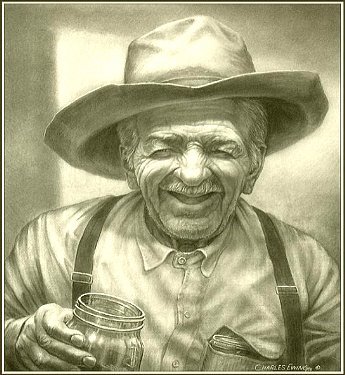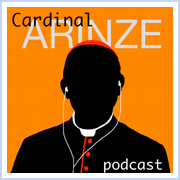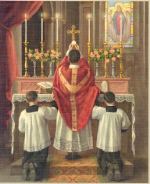Gospel for Nov 12, Memorial: St. Josapath, Bishop & Martyr
From: Luke 18:1-8
Persevering Prayer. Parable of the Unjust Judge
[1] And He (Jesus) told them a parable, to the effect that they ought always to pray and not lose heart. [2] He said, "In a certain city there was a judge who neither feared God nor regarded man; [3] and there was a widow in that city who kept coming to him saying, `Vindicate me against my adversary.' [4] For a while he refused; but afterward he said to himself, `Though I neither fear God nor regard man, [5] yet because this widow bothers me, I will vindicate her, or she will wear me out by her continual coming.' [6] And the Lord said, "hear what the unrighteous judge says. [7] And will not God vindicate His elect, who cry to Him day and night? Will He delay long over them? [8] I tell you, He will vindicate them speedily. Nevertheless, when the Son of Man comes, will he find faith on earth?"
*********************
Commentary:
1-8. The parable of the unjust judge is a very eloquent lesson about the effectiveness of persevering, confident prayer. It also forms a conclusion to Jesus' teaching about watchfulness, contained in the previous verses (17:23-26). Comparing God with a person like this makes the point even clearer: if even an unjust judge ends up giving justice to the man who keeps on pleading his case, how much more will God, who is infinitely just, and who is our Father, listen to the persevering prayer of His children. God, in other words, gives justice to His elect if they persist in seeking His help.
1. "They ought always to pray and not lose heart." Why must we pray?
"1. WE MUST PRAY FIRST AND FOREMOST BECAUSE WE ARE BELIEVERS.8. Jesus combines His teaching about perseverance in prayer with a serious warning about the need to remain firm in the faith: faith and prayer go hand in hand. St. Augustine comments, "In order to pray, let us believe; and for our faith not to weaken, let us pray. Faith causes prayer to grow, and when prayer grows our faith is strengthened" ("Sermon", 115).
"Prayer is in fact the recognition of our limitation and our dependence: we come from God, we belong to God and we return to God! We cannot, therefore, but abandon ourselves to Him, our Creator and Lord, with full and complete confidence [...].
"Prayer, therefore, is first of all an act of intelligence, a feeling of humility and gratitude, an attitude of trust and abandonment to Him who gave us life out of love.
"Prayer is a mysterious but real dialogue with God, a dialogue of confidence and love
"2. WE, HOWEVER, ARE CHRISTIANS, AND THEREFORE WE MUST PRAY AS CHRISTIANS.
"For the Christian, in fact, prayer acquires a particular characteristic, which completely changes its innermost nature and innermost value. The Christian is a disciple of Jesus; he is one who really believes that Jesus is the Word Incarnate, the Son of God who came among us on this earth.
"As a man, the life of Jesus was a continual prayer, a continual act of worship and love of the Father and since the maximum ___expression of prayer is sacrifice, the summit of Jesus' prayer is the Sacrifice of the Cross, anticipated by the Eucharist at the Last Supper and handed down by means of the Holy Mass throughout the centuries.
"Therefore, the Christian knows that his prayer is that of Jesus; every prayer of his starts from Jesus; it is He who prays in us, with us, for us. All those who believe in God, pray; but the Christian prays in Jesus Christ: Christ is our prayer!
"3. FINALLY, WE MUST ALSO PRAY BECAUSE WE ARE FRAIL AND GUILTY.
"It must be humbly and realistically recognized that we are poor creatures, confused in ideas, tempted by evil, frail and weak, in continual need of inner strength and consolation. Prayer gives the strength for great ideas, to maintain faith, charity, purity and generosity. Prayer gives the courage to emerge from indifference and guilt, if unfortunately one has yielded to temptation and weakness. Prayer gives light to see and consider the events of one's own life and of history in the salvific perspective of God and eternity. Therefore, do not stop praying!
Let not a day pass without your having prayed a little! Prayer is a duty, but it is also a great joy, because it is a dialogue with God through Jesus Christ! Every Sunday, Holy Mass: if it is possible for you, sometimes during the week. Every day, morning and evening prayers, and at the most suitable moments!" (John Paul II, "Audience with Young People", 14 March 1979).
Our Lord has promised His Church that it will remain true to its mission until the end of time (cf. Matthew 28:20); the Church, therefore, cannot go off the path of the true faith. But not everyone will remain faithful: some will turn their backs on the faith of their own accord. This is the mystery which St. Paul describes as "the rebellion" (2 Thessalonians 2:3) and which Jesus Christ announces on other occasions (cf. Matthew 24:12-13). In this way our Lord warns us, to help us stay watchful and persevere in the faith and in prayer even though people around us fall away.
***********************
Source: "The Navarre Bible: Text and Commentaries". Biblical text taken from the Revised Standard Version and New Vulgate. Commentaries made by members of the Faculty of Theology of the University of Navarre, Spain. Published by Four Courts Press, Kill Lane, Blackrock, Co. Dublin, Ireland.
Reprinted with permission from Four Courts Press and Scepter Publishers, the U.S. publisher.













